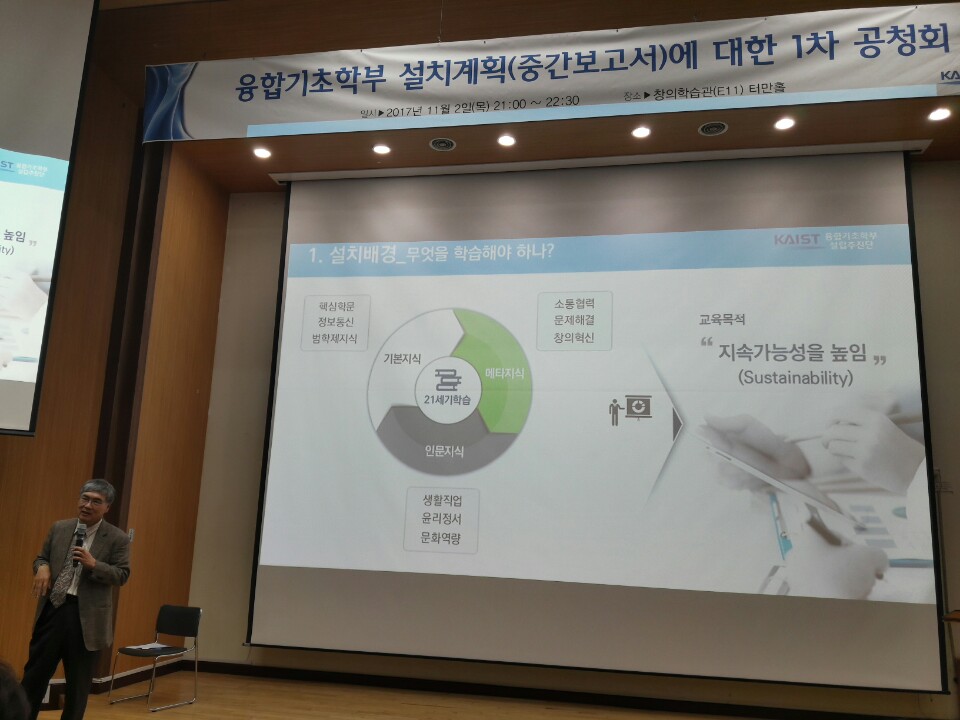Undergraduate Student Council (USC), PUUM, and the Transdisciplinary Fundamental Studies Deliberation Committee (Deliberation Committee) cohosted a public hearing to discuss what has been a highly controversial proposal to establish a new department/major: the Department of Transdisciplinary Science and Engineering (TSE).
The proposed Department of Transdisciplinary Science and Engineering is the new name for the “Non-Departmental Education System”, which was one of the three goals/policies outlined by KAIST President Shin in his inauguration speech back in March. Since then the policy has been subjected to heavy public scrutiny, not only based on the policy’s merits and demerits, but also based on the lack of transparency surrounding its development. After multiple requests made by the USC to publicize proceedings, the Deliberation Committee agreed to host more public discussions about its proposal.
In the first “half” of the hearing, Executive Vice President (VP) and KAIST Professor O Ok Park and Head of the Deliberation Committee Jong-Duk Kim presented the interim report, which outlined the details of the proposed policy. According to the report, the purpose of the Department of Transdisciplinary Science and Engineering is to train multidisciplinary students capable of solving today’s complex problems and flexible enough to accordingly adjust their careers in a rapidly changing world.

One of the key features of the proposed major is that students are given more freedom than in other majors to customize their curriculum. Under the current proposed curriculum, TSE students would have to take six “basic multidisciplinary” courses, which are the TSE equivalent of required major courses. These mandatory courses allegedly provide the foundation for students to later pursue any curriculum of their choice, customized or not. Subjects such as organic chemistry, economics, molecular biology, mathematical modeling, and programming have been suggested as possible candidates for these six subjects, but the Deliberation Committee has nothing yet set in stone.
The “advanced multidisciplinary” courses, which are the TSE equivalent of major elective courses, are where customization comes into the equation. By taking a host of these advanced courses, 11 to be exact, students are allowed to specialize in a field of interest that cannot easily be studied under the major course requirements of existing departments. In fact, students of this major will be allowed to fill up their 11-course quota by enrolling in classes hosted by existing departments. This may well likely be the case for the first couple of years should the TSE major be established, as these advanced courses are set to be finished in 2019, only one year after the department is scheduled to be implemented.
What sets apart the final year of the TSE major are the internship program and the University Team Research Program (UTRP), a collaborative twist on the existing University Research Program (URP). Executive VP Park believes that one of the core reasons why the National University of Singapore (NUS) ranks higher than KAIST is its internship program. NUS students receive eight credits for participating in the internship program, gaining valuable industry experience while simultaneously fulfilling their credit requirements.
The second “half” of the hearing was an extended Q&A session, during which several students strongly voiced their opinions and concerns regarding the proposed department. The audience’s concerns were largely three-fold. First, it was suggested that the proposal to establish a new major was premature in its current state, especially in the absence of a finalized curriculum. The argument was that if the curriculum was to still be in development while students are actually enrolling in the department, those students won’t be able to plan their immediate future, much less their long-term careers, something that this proposed program aims to do. Naturally, the general consensus was that the TSE major should not be implemented in February 2018 as originally planned.
Second, many students pointed out the redundancy of the TSE major itself in fulfilling its founding purpose. For some, the current range of academic options — double major, minor, advanced major, and individually designed major — suffices in realizing TSE’s goal. They argued that students can choose the appropriate combination of existing majors to gain a multidisciplinary background, and hence it is futile to put manpower and resources into building a new major.
Finally, many in the audience demanded that the Deliberation Committee allow more student participation in the development of the policy. With the influx of questions and inquiries showing no sign of slowing down, the Head of the Deliberation Committee closed the curtains on a public hearing that lasted for four hours, two and a half hours longer than was originally intended. There were still many questions that were unresolved and issues that the Deliberation Committee were yet prepared to answer. As a result, there was an outcry of requests for a second public hearing, the schedule for which has yet to be confirmed by the school.

